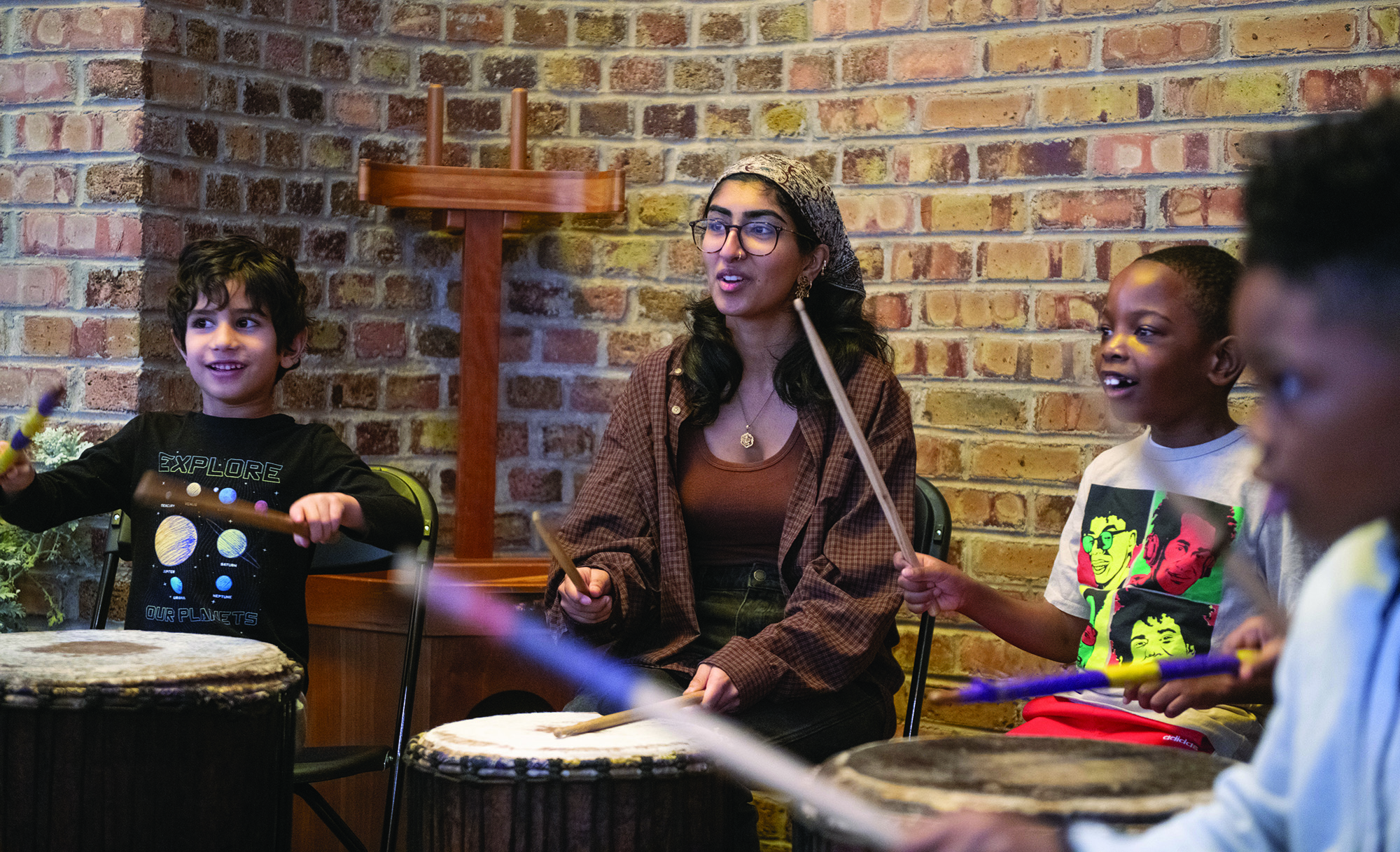
UChicago students foster creativity at a South Side school for neurodiverse kids.
Volunteering at City Elementary, Alli Marney-Bell noticed how much music helped the neurodiverse students she worked with thrive and grow. She was particularly excited to see a minimally speaking student express himself through sharing favorite songs, improvising in musical groups, and composing with software.
“He was very hesitant to raise his hand, answer questions, or share his work,” says Marney-Bell, a fourth-year student in the College. “It was amazing to see him come out of his shell—and to see the music work to get him excited about learning and collaborating. … I feel like it led to a greater appreciation of music for me.”
This year 33 UChicago student volunteers, like Marney-Bell, are teaching at City Elementary, an independent school just north of Hyde Park that focuses on fostering a positive environment for children who are neurodiverse—with diagnoses including autism, ADHD (attention deficit hyperactivity disorder), and learning disabilities that make traditional classroom environments overwhelming or anxiety provoking.
UChicago’s nearly decade-long partnership with the school has generated programs that rethink and revitalize how City’s students experience the classroom. “I think it’s been a key for UChicago students to have the opportunity to not only understand neurodiversity but also do something positive with it,” says Christopher Flint, head of school at City Elementary.
UChicago has eight partner programs with City. The Music Sociality program, led by Jennifer Iverson—an associate professor in the University’s Department of Music and board chair of City Elementary—gets students collaborating on songs and discussing musical tastes to improve their social skills in a fun and welcoming environment.
For Iverson these activities can be perfect ways for autistic children to practice reciprocal communication and listening: “What happens if you don’t like something that your friend does? And how can you express your own opinion, but in a way that still demonstrates kindness for your friend? How can you engage in some position taking and ask a curious question? These are the complex negotiations that happen when we’re in a musical scenario.”
“Music as a practice is inherently very communal,” adds Alejandro Cueto, a graduate student in the Department of Music and a teacher in Music Sociality. “There’s so much nonverbal communication, so much collaboration involved throughout the practice.”
Another UChicago partner program called Med-ucate makes navigating physical and mental health fun and engaging for neurodiverse children. “We wanted the kids to be able to know the basics about their bodies so that they can learn how to take care of themselves physically and mentally,” says Simi Golani, a third-year College student who cofounded Med-ucate.
Exercises like practicing calming techniques in stressful situations or locating local health resources are designed to foster independence for neurodiverse children, who are more likely to face barriers to improving their health. “When we look at the data,” says Flint, “it shows that [neurodiverse] individuals aren’t going to the doctor as much, and have poorer health outcomes than neurotypical individuals, because of a lack of access.” Through Med-ucate he’s seen City students “take more ownership and advocacy over their own health, which is fantastic.”
Other UChicago-led partnerships engage City students in activities including dog clubs, philosophical discussions, and drawing maps of the human brain. The volunteers get to share their passions in ways that are concrete, hands-on, and adapted to the emotional needs and interests of neurodiverse kids.
They also get on-the-ground knowledge of neurodiversity. “We’re training these UChicago students to become adults who are more sensitive to the kinds of access adjustments and environmental adjustments that will make the world a friendlier place for neurodiverse people,” says Iverson.
City Elementary also works with third- and fourth-year UChicago Medicine students, who complete community rotations as part of their medical training. Through tutoring about nutrition and health, they develop knowledge to help navigate interactions with future patients. “They’re going to be urologists and they’re going to be general practitioners, and one day they’re going to get a neurodivergent individual that comes to their practice and they’re going to remember City,” says Flint.
Knowledge and firsthand experience from the program led one UChicago student to change her entire career trajectory. Cristina Gaudio, SB’23, was studying finance when she volunteered with City during her fourth year in the College. “I’m now going to apply to law school to immerse myself in disability law, special education law, and family law to see how this issue affects families and what resources can be provided,” she says.
The distinctive focus of City and UChicago student volunteers on the individual social needs and interests of each student has been felt among City Elementary families, many of whom faced inaccessible environments and rejections before finding a school offering tailored programs, flexibility, and social support.
Sherley Chavarria, a City Elementary parent, noted the difference that the new environment made for her child. “He isn’t nearly as anxious or resistant to go to school. … As he enters the building, he does so confidently. At home, he shares stories about what he’s learning,” she says.
The opportunity to help kids in the community and foster meaningful and authentic interactions is also a key motivator for the student volunteers. “I can confidently say of all the extracurricular things I’ve done, and I’ve tried everything, this is my favorite because I like the people,” says Maxwell Kay, a fourth-year involved in City’s partnership with Students for Disability Justice. “So much of school is abstract, but when you get to go somewhere and see that some kid has benefited from the effort you put in that day, that’s the most rewarding thing in the world.”
